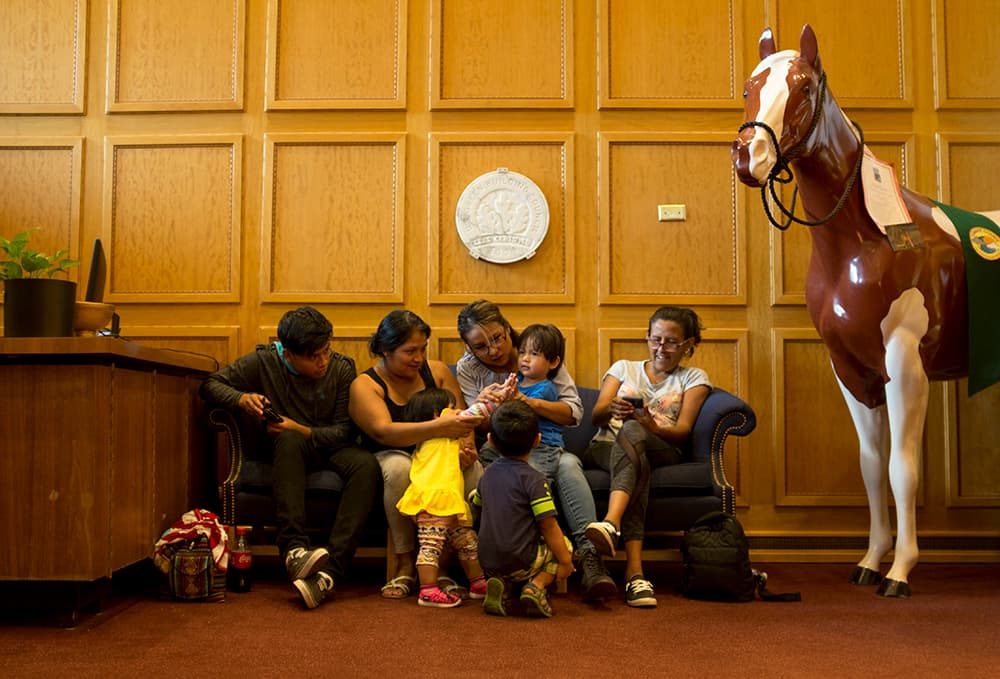
The Denver City Council voted Monday to set aside $200,000 toward a legal defense fund for people facing deportation and other immigration proceedings, though the idea of spending taxpayer money on immigrants’ court cases created a philosophical divide and a split decision.
In August, Mayor Michael Hancock signed an executive order that introduced the idea of the fund. This was part of the compromise between Hancock and some City Council members as the city debated just how far it would go in not cooperating with federal immigration authorities. Later in the year, Hancock included $100,000 for the legal defense fund in his proposed budget.
At the elected board's Monday meeting, though, Councilman Paul López moved to increase spending on the fund.
He said that the city should set aside $200,000 in its budget to create the defense fund. He also proposed that the money for the fund be placed in the budget of the city's program for human rights, rather than coming from the city's general contingency fund.
"We’ve been put in a position where we have to do a little bit extra, especially when it comes to protecting Denver as that welcoming city," López said.
This was council members' last opportunity to make changes to the mayor's proposed budget. Earlier this fall, immigration advocates urged council members to do just this -- increase spending on the program and move the program out of contingency.
The council debated whether this was a good use of public money.
The fund would pay for nonprofits and foundations to get involved in immigration cases. An advisory committee is currently working on a set of recommendations about how the fund should work, but López said he wanted to specifically secure government money for the program.
Councilwoman Robin Kniech agreed, saying that now was the only time of the year that the council could introduce new spending.
"We have families in Denver who may be separated because someone may not be aware of a status they were eligible for," she said.
But the idea of spending public money on the program gave some members pause, prompting questions about whether the defense fund is an appropriate use of taxpayer resources.
"I want everybody to have a lawyer. I just don’t think I can ask the Denver taxpayer to pay for a private individual's lawyer in a federal proceeding," said Councilman Kevin Flynn.
Flynn also asked whether the money might end up assisting people facing serious criminal charges, pointing to the case of an undocumented immigrant whom he said was arrested for dealing heroin near his office.
Councilwoman Kendra Black also said that she would be happy to donate privately but disagreed with public spending.
Councilwoman Mary Beth Susman said that she wanted more detail on the defense program first.
"Before we actually spend this money, we need a system -- we need to know where it’s going to reside, who’s in control of it," she said. "When you spend public dollars for private good, it has to be very narrowly defined."
But supporters of the fund argued that helping immigrants was good for the public.
"The public good is keeping families together. It’s not only Latino families. It's Somali, Ethiopian refugees and immigrants," said Councilwoman Stacie Gilmore.
Kniech also said that the public costs of separating families are significant. When breadwinners are deported, children might end up needing food assistance and other public benefits, and their performance in school suffers.
And Councilman Paul Kashmann pointed out that the city already spends public money to help private individuals with their rent and utility bills. The city's legal staff agreed that there was precedent for a similar program.
Councilman Rafael Espinoza said that in a time of strife, it was important to "toe the line."
"Is there the chance for a mistake? Yes. Am I willing to suffer political consequences?" he asked rhetorically. He was, he said.
Here's how they voted:
Council members Albus Brooks, Jolon Clark, Wayne New, Espinoza, Gilmore, Kniech, López and Ortega voted in favor of setting aside the new line item for the fund. Council members Chris Herndon, Susman, Black and Flynn voted against the spending. That's a 9-4 decision.
New supported moving the money for legal defense out of contingency, but he wanted to spend only $100,000 on the fund. So, the proposal to increase the spending only passed 8-5.
The proposed change now goes to Hancock. If he rejects it, the council could override him with a two-thirds vote.
The mayor's office said that he will accept the changes.
“We respect council’s vote to move on the funding for the legal defense fund and will accept this amendment," spokesperson Jenna Espinoza wrote in an email.
The city has been convening working groups to determine funding and other details. "These workgroups will be proposing well-vetted recommendations for a comprehensive plan later this month," she added.
"The work to establish a structure and additional funding mechanisms, including private-sector and philanthropic support, will continue.”













